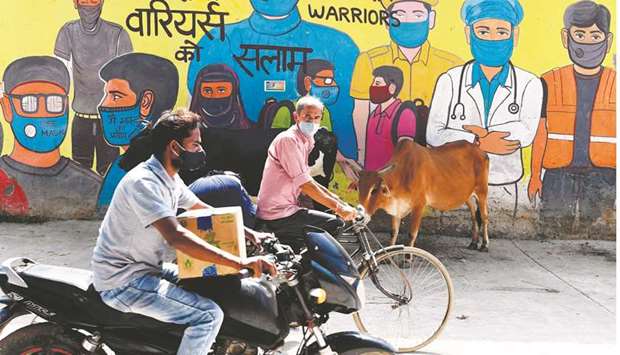More than 60mn people in India -10 times the official figure - could have contracted the novel coronavirus, the country’s lead pandemic agency said yesterday, citing a nationwide study measuring antibodies.
According to official data India, home to 1.3bn people, is the world’s second most infected nation, with more than 6.1mn cases, just behind the United States.
But the real figure could be much higher, according to the latest serological survey - a study testing blood for certain antibodies to estimate the proportion of a population that has fought off the virus.
“The main conclusions from this sero-survey are that one in 15 individuals aged more than 10 have been exposed to Sars-CoV-2 by August,” Indian Council of Medical Research (ICMR) director-general Balram Bhargava said at a Health Ministry press conference.
Bhargava said evidence of virus exposure was more prevalent among people tested in urban slums (15.6%) and non-slum urban areas (8.2%), than in rural areas, where 4.4% of those surveyed had antibodies.
The blood tests were collected from just over 29,000 people in 21 states or territories between mid-August and mid-September.
The new figures are a sharp jump from the first sero-survey results, which the ICMR said showed that around 0.73% of adults in India - about 6mn people - were infected by May.
Other antibody studies conducted in New Delhi and Mumbai have suggested more infections than the official numbers say.
Scientists warn, however, that antibody tests should be treated with caution because they also pick up exposure to other coronaviruses, not just the one that causes Covid-19, the disease which has killed more than 1mn people worldwide since it emerged late last year.
India - which has one of the world’s most poorly funded healthcare systems - has gradually lifted a strict lockdown imposed in late March even as infections steadily climb, to revive its battered economy.
India yesterday reported its smallest daily rise in coronavirus deaths since August 3 of 776, data from the Health Ministry showed.
The country’s coronavirus case tally rose to 6.15mn after it reported 70,589 new infections in the last 24 hours, according to data, while total deaths stood at 96,318.
The sudden drop in the number of active cases in the country has raised some hope among health experts, although they say the country must observe this trend for at least two weeks before concluding that the Covid-19 plateau is over and the downward trend is for real.
Navneet Sood, a consultant at Dharamshila Narayana Superspeciality Hospital in New Delhi, said the authorities must focus on the factors leading to this trend.
“At the same time, this decline should continue for at least two upcoming weeks and only then can we have some idea about the success we are on the way to achieve,” Sood said.
“This infection spread so fast that in a couple of months, it has changed the entire lifestyle of humanity.
We have a long way to go hence this drop should be taken as a success but a challenge to maintain for days to come,” he added.
Jyoti Mutta of Sri Balaji Action Medical Institute said: “Although this steady decline in numbers should make us hopeful, the same trend should continue for at least 15 days or a month.
Only then can we say whether the plateau has been achieved or not.”
According to Praveen Gupta of Fortis Memorial Research Institute, Gurugram, there has been a drop in cases in Delhi which is very heartening.
“But we had a similar occurrence a month back when the cases had dropped below 1,000 but they increased to as high as 4,000 cases a day now,” Gupta said.

Commuters move past a mural representing frontline warriors battling the coronavirus pandemic, painted on the wall of a dumping ground in New Delhi yesterday.
